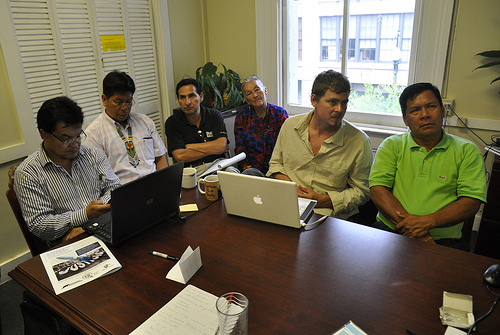
Last night, four Indigenous and community leaders from Ecuador arrived in very steamy New Orleans to share their experiences with the long-term impacts of oil pollution with communities dealing with the tragic BP oil spill that continues to gush into the Gulf of Mexico.
As the Chevron in Ecuador blog reports:
Four very different people arrived last night in New Orleans on a late flight from Quito, Ecuador. One is a quiet but fierce 71-year-old grandmother with 27 grandchildren. Another is a gentle, soft-spoken man who is a leader of his Indigenous tribe from the Amazon. Another is a serious and sober man who has won worldwide acclaim for his unique work. And the last is another Indigenous man from the Amazon, who is more sharp-tongued than his traveling companion, but shares his good humor and dignified demeanor.
The four Indigenous and community leaders from Ecuador’s Amazon rainforest are on the front-lines of the nearly two-decade struggle to demand oil giant Chevron clean up the massive contaminate the company left behind in their lands. I’ve written profiles of two of them here before; Cofan leader Emergildo Criollo was in the U.S. in early March to help deliver 350,000 letters of support for cleanup in Ecuador to new Chevron CEO John Watson and campesina activist Mariana Jimenez was in Houston just a few weeks ago to speak out at Chevron’s 2010 shareholder meeting.
With them is Humberto Piaguaje, a leader of the Secoya tribe who has been outspoken about Chevron’s impact on his people, and Luis Yanza, who has helped organize the 30,000 people who have mounted the historic legal action against Chevron. In 2008, Luis won the Goldman environmental prize, often described as the Nobel Prize for the environment.
Gulf Coast American Indian Tribes in southeast Louisiana impacted by BP’s oil disaster will be hosting a cultural exchange with their Ecuadorean counterparts who have been severely impacted for decades by Chevron’s oil contamination in Ecuador’s rainforest. The Amazon leaders will tour areas of the Bayou affected by the spill, have community exchanges with the Houma and other Gulf coast residents, and participate in a public meeting in the heart of the largest Houma community on Thursday evening. The Ecuadorean leaders hope to share their experiences in recovery and protecting health, livelihoods, and culture in the wake of an oil disaster of this magnitude.
“The Gulf spill is an absolute threat on who we are as Houma people and our way of life. Our homeland and the health of our people are at risk and we must plan for the long-term effects of this catastrophe,” said Thomas Dardar Jr., Principal Chief of the United Houma Nation. “We look forward to meeting our brothers and sisters of the Amazon and sharing ideas and solutions regarding protecting the indigenous way of life when faced with such huge environmental impacts.”
The United Houma Nation is a state recognized Tribe of approximately 17,000 citizens that reside along the coastal marshes of southeast Louisiana. Traditionally Houmas have lived off the land and work as fishermen and trappers. As the Deepwater Horizon disaster unfolds it holds a deeper meaning for the Houmas, who reside on the front lines – it is the uncertainty of whether the culture of the Houma as it stands today will survive.
“Our hearts broke upon seeing images of the tragic spill in the Gulf of Mexico,” said Emergildo Criollo, a leader of the Cofan tribe in Ecuador’s rainforest who is participating in the delegation. “We are honored to accept the invitation of the United Houma Nation to visit the Gulf. We hope what we have learned from our own torment at the hands of Chevron will strengthen the resolve of the communities affected by the BP spill.”
To follow the Ecuadoreans journey in the Gulf this week, follow @ChangeChevron on Twitter or on Facebook.